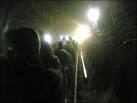My colleague, Dr Oliver Heath, and I have today submitted a proposal to the "full application" round of the Leverhulme Trust's Research Projects Grant competition (the deadline is December 1; the "outline application" was submitted in June 2009). A brief synopsis is below. If you're working in the area of Twitter and politics, or are considering a project in this area and would like more information regarding our theoretical framework, research questions, and hypotheses, contact me by email: andrew.chadwick@rhul.ac.uk.
Online Interpersonal Communication, Accidental Exposure and By-Product Political Learning During the British General Election of 2010: A Study of Twitter.
We know very little about how the internet now shapes political behaviour in Britain. Most of what we do know comes from valuable empirical political science funded during the early 2000s. But since then, citizens’ online political habits and the nature of the internet have both changed dramatically, with the now well-established shift toward greater interactivity and interpersonal communication through online social network sites and web 2.0 services. This project will empirically explore the contemporary internet’s effects on political engagement by focusing on interpersonal communication, accidental exposure, and by-product political learning. To do so, it will examine parliamentary candidates’ and the public’s behaviour on Twitter—the most intriguing, controversial, and fastest growing online social network service in the UK to date—during the general election of 2010. The project will explore the general role and function of Twitter in British political communication, but most importantly it will assess the extent to which the serendipitous nature of web 2.0 online environments increases levels of accidental exposure to political information. It will identify the extent to which interpersonal communication creates accidental exposure that may or may not lead to by-product political learning and political engagement, including voting.
Studying political communication in a diffuse interpersonal environment like Twitter has many advantages, but it also presents significant methodological challenges. We seek to overcome these through a research design incorporating a novel, nonintrusive, natural experiment. Multivariate statistical analyses, including multiple regression (with lagged variables), simultaneous latent class analysis and structural equation modelling, will be used to test hypotheses about direct exposure and accidental exposure to candidates’ messages and by-product learning about politics, relative entertainment preference, political interest, political efficacy, and political engagement (including voting), and other salient variables.
 The Political Studies Association annual conference for 2010 will be held in Edinburgh on 29 March - 1 April. Ben O'Loughlin will take part on a panel 'communicating terror' organised by Piers Robinson at the University of Manchester. Combining arguments from the forthcoming book on Diffused War (with Andrew Hoskins) and the NPCU's work on strategic narratives, the paper will examine how different actors are getting to grips with communication nearly five years on from the 7/7 London bombings.
The Political Studies Association annual conference for 2010 will be held in Edinburgh on 29 March - 1 April. Ben O'Loughlin will take part on a panel 'communicating terror' organised by Piers Robinson at the University of Manchester. Combining arguments from the forthcoming book on Diffused War (with Andrew Hoskins) and the NPCU's work on strategic narratives, the paper will examine how different actors are getting to grips with communication nearly five years on from the 7/7 London bombings.

